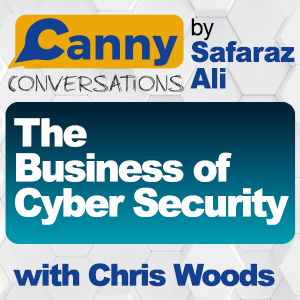The Business Of Cyber Security


Most businesses hold personal data and a lot of it. This includes data about employees, contractors and customers.
Keeping this safe is a must as Safaraz Ali discusses with his guest Chris Woods from the CyberQ group. The cost of not doing so can be devastating both financially and reputationally.
In this podcast Saf and Chris look at Cybercrime from the perspective of businesses and larger organisations.
There are many reasons for cybercrime and it can take on different forms.
These can range from organised crime through to discounted employees or former employees looking for revenge. Chris Woods from the CyberQ Group has seen them all.
Safaraz Ali whose business interests involve holding large amounts of personal data knows how important security is and tries to build it into the culture of his staff.
Chris reminds listeners that the regulator can fine a business up to five per cent of annual turnover for a data breach. But whilst this is enough to bring executives out in a cold sweat, the reputational damage can be even greater and, in some cases, not only game changing but the end game for businesses that fall foul.
Saf talks about how, like many businesses, cyber security as part of the IT budget has grown in a bid to beat the crooks.
CyberQ operates in the UK, USA and Asia so Chris shares his experiences as to how businesses in different parts of the world view cybercrime. He tells of how in some cases the risk and seriousness of being a victim is too often not understood until too late. The idea that prevention is better than cure is very applicable to internet security. Stress testing and seeing how secure a customers’ systems are is a big part of what CyberQ does.
As a chief executive and company chairman, Saf wants his businesses to be safe but also able to operate efficiently with the minimum of inconvenience to staff, suppliers and customers. They talk about getting the balance right. Staff can often be the weakest link in a security protocol, sometimes because they are malicious but often through carelessness or because they have not been given proper training. The podcasts provide important guidance for businesses from start-ups to multinationals.











Responses